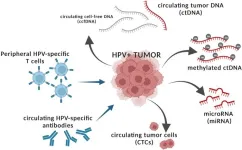(Press-News.org)
Government legislation to flag and moderate dangerous content on social media can be effective in reducing harm, even on fast-paced platforms such as X (formerly Twitter) new research shows.
Social media posts such as those that promote terrorism and hate, dangerous challenges that put teen lives at risk, or those that glamorise suicide, pose a significant threat to society. And this harm spreads exponentially, like an infectious disease.
Dr Marian-Andrei Rizoiu from the University of Technology Sydney (UTS) Behavioural Data Science Lab and Philipp J. Schneider from École Polytechnique Fédérale de Lausanne harnessed state-of-the-art information spread modelling to analyse the dynamics of content dissemination.
The study, The Effectiveness of Moderating Harmful Online Content, has just been published in the journal PNAS. It finds that even with a 24-hour turnaround time, government mandated external moderation is likely to be effective in limiting harm.
“Social networks such as Facebook, Instagram and Twitter, now X, don’t have much incentive to fight harmful content, as their business model is based on monetising attention,” says Dr Marian-Andrei Rizoiu from the University of Technology Sydney (UTS) Behavioural Data Science Lab.
“Elon Musk acquired Twitter with the stated goal of preserving free speech for the future. However, alongside free speech, mis- and disinformation spreads and prospers in this unregulated space.”
In response, many countries including Australia, are looking to intervene and regulate. The European Council has taken the groundbreaking step of introducing the Digital Services Act and the Digital Markets Act to combat the dissemination of dangerous content.
The EU legislation requires trusted flaggers to identify harmful content, which platforms must then remove within 24 hours. However, critics have suggested the legislation might be ineffective given the speed at which social media content spreads.
“We’ve seen examples on Twitter where the sharing of a fake image of an explosion near the Pentagon caused the US share market to dip in a matter of minutes, so there were doubts about whether the new EU regulations would have an impact,” says Dr Rizoiu.
To better understand the relationship between the moderation delay and the likely harm reduction achieved, the researchers examined two key measures: potential harm and content half-life.
Potential harm represents the number of harmful offspring generated by a single post, and content half-life denotes the time required for half of all offspring to be generated.
Prior research has determined the half-life of social media posts on different platforms. X (Twitter) has the fastest half-life at 24 minutes, followed by Facebook at 105 minutes, Instagram 20 hours, LinkedIn 24 hours, and 8.8 days for YouTube.
“A lower half-life means that most harm happens right after the content is posted, and content moderation needs to be performed quickly to be effective. We found the reaction time required for content moderation increases with both the content half-life and potential harm,” he said.
The study has implications for policymakers looking to introduce similar legislation in other countries. It can provide a framework and valuable guidance around mechanisms for content moderation by indicating where to focus fact-checking efforts and how quickly to react.
“The key to successful regulation includes appointing trusted flaggers, developing an effective tool for reporting harmful content across platforms, and correctly calculating the necessary moderation reaction time,” Dr Rizoiu says.
“By understanding the dynamics of content spread, optimising moderation efforts, and implementing regulations like the EU’s Digital Services ACT, we can strive for a healthier and safer digital public square where harmful content is mitigated, and constructive dialogue thrives.”
END
Older adults who play digital puzzle games have the same memory abilities as people in their 20s, a new study has shown.
The study, from the University of York, also found that adults aged 60 and over who play digital puzzle games had a greater ability to ignore irrelevant distractions, but older adults who played strategy games did not show the same improvements in memory or concentration.
It is known that as humans age, their mental abilities tend to decrease, particularly the ability to remember a number of things at a single time - known as working memory. Working ...
Inoue Receives Funding For Mason CARES Plus
Megumi Inoue, Associate Professor, Social Work, received funding for: "Mason CARES Plus."
Mason CARES Plus is an expansion study to Mason CARES that will focus on conducting in-depth focus groups and online semi-structured interviews to assess which specific aspects of the Stress Busting Program (SBP) and the Music and Memory program (M&M) were most (and least) impactful in reducing care partner stress and identify effective strategies to improve care partner engagement with the M&M program among Mason CARES participants.
Preliminary results from the Mason CARES study show a high ...
Hopping in the shower, we anticipate the warm water to be cleansing and renewing after a long, hard day — but there may be something dangerous lurking in the showerhead.
Showers can expose us to many types of bacteria cells. Most are harmless, but some – called drinking water-associated pathogens of the immunocompromised (DWPIs) – can pose a serious risk to our health, especially for individuals with weakened immune systems.
Sarah Haig, Assistant Professor of Civil and Environmental Engineering at the University of Pittsburgh Swanson School of Engineering, received $420,000 from the National Science Foundation ...
Boston, MA - New research led by Boston Medical Center and Boston University School of Public Health found that children who received integrated mental health care showed improvements in both mental health and school performance. These findings, published in the Journal of Developmental & Behavioral Pediatrics, examined changes over time in outcomes among 6-12-year-old children receiving integrated behavioral health care at three federally qualified health centers (FQHCs) that implemented the TEAM UP Model of care.
The study, which included 51 children serviced ...
“We discuss existing clinical data on these surrogates of tumor burden and their potential in evaluating efficacy of immunotherapy in HPV-associated malignancies.”
BUFFALO, NY- August 14, 2023 – A new review paper was published in Oncotarget's Volume 14 on August 10, 2023, entitled, “Peripheral surrogates of tumor burden to guide chemotherapeutic and immunotherapeutic strategies for HPV-associated malignancies.”
With the rapid adoption of immunotherapy into clinical practice for HPV-associated ...
When it comes to translational medicine, Robert Gourdie is among the 2 percent of “super-producers,” National Institutes of Health-funded scientists at U.S. biomedical institutions who hold 10 or more issued patents.
Super-producers were responsible for half of all patents issued according to research published Aug. 11 in Nature Biotechnology. The objective of the research was to create a tool to better quantify bridges and barriers to clinical translation of biomedical discoveries.
The research marks a novel area of inquiry for Gourdie, a professor and cell biologist at the Fralin Biomedical ...
In the rush to harness artificial intelligence and machine learning tools to make care more efficient at hospitals nationwide, a new study points to another possible use: identifying patients with non-medical needs that could affect their health and ability to receive care.
These social determinants of health – everything from transportation and housing to food supply and availability of family and friends as supports – can play a major role in a patient’s health and use of health care services.
The new study ...
A new study from clinicians and researchers at the University of Michigan Rogel Cancer Center, U-M Department of Pathology and the Michigan Center for Translational Pathology reveals findings from over 800 clinical assays performed for kidney patients with MiTF family gene mutations. This study, published in the American Journal of Clinical Pathology¸ is the largest series of its kind in kidney cancer and carries deep clinical and diagnostics implications.
The team, led by Rohit Mehra, M.D., performed over 800 clinical assays on the MiTF family genes TFE3 and TFEB in renal tumors with morphologic and biomarker alterations considered suspicious for MiTF family genetic mutations.
The ...
The latest study about of proboscideans (elephants and their ancient relatives) from the University of Helsinki provides proof that some proboscideans started to adapt to locally grass-rich environments in East Africa first by changing their behavior and starting to feed more on grasses. This happened in some lineages of proboscideans, such as choerolophodonts, much earlier than has been thought until now, about 23 to 11 million years ago in parts of East Africa
Also, around 7 million years ago in the lake Turkana region, increasingly grass-rich diets of the earliest true ...
CLEVELAND: A first-in-human trial of deep brain stimulation (DBS) for post-stroke rehabilitation patients by Cleveland Clinic researchers has shown that using DBS to target the dentate nucleus – which regulates fine-control of voluntary movements, cognition, language, and sensory functions in the brain – is safe and feasible.
The EDEN trial (Electrical Stimulation of the Dentate Nucleus for Upper Extremity Hemiparesis Due to Ischemic Stroke) also shows that the majority of participants (nine out of 12) demonstrated ...



